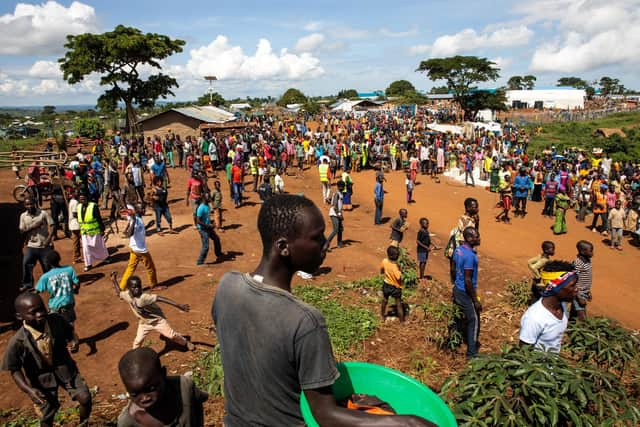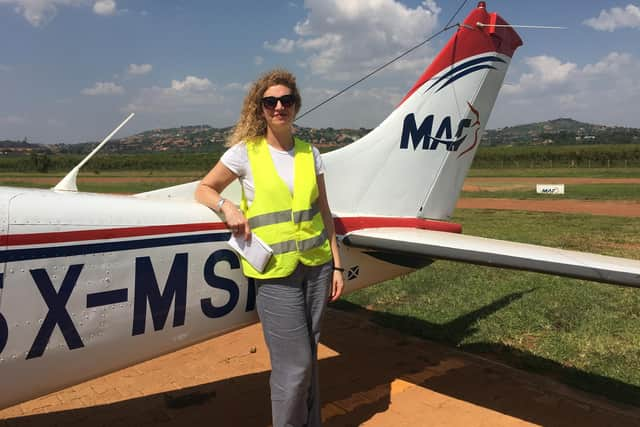‘Disaster’ unfolding in Uganda amid aid funding crisis, warns Scottish charity director
A Scottish charity director has warned a “disaster” risks unfolding in an east African country due to major funding cuts that will further imperil the nation’s already volatile refugee population.
Ruth Jack, who oversees Mission Aviation Fellowship’s (MAF) humanitarian work in Uganda, said an end to a vital United Nations financing stream in just three months’ time could be potentially “catastrophic” for a nation that has seen more than 35,000 refugees arrive since the start of the year due to regional unrest.
Advertisement
Hide AdAdvertisement
Hide AdMs Jack, from Dumbarton, said she was already witnessing hunger-related problems in children and food shortages across the country’s sprawling refugee camps. She stressed “thousands of lives are in danger” due to the imminent cuts.
There are an estimated 1.54 million displaced people in Uganda, making it one of the most important refugee host countries in the world and the largest on the African continent. The sheer number of refugees in the nation is primarily due to violence in neighbouring South Sudan and the Democratic Republic of Congo (DRC).
However, vital services such as hospitals and schools are under severe strain due a lack of resourcing. And with a critical funding pipeline from the UN’s World Food Programme (WFP) drying up, Ms Jack has backed calls for urgent interventions to assist aid efforts in the landlocked African country.
The WFP’s funding in Uganda has been repeatedly slashed in recent years, which Ms Jack said she believed was due to financing being diverted to assist with humanitarian needs in other countries, such as Ukraine, Syria, and Turkey. As things stand, Uganda receives the lowest amount of assistance via the programme than any other country in the region.
Ms Jack has been working out of Kampala as the MAF’s country director for Uganda since the start of last year, co-ordinating with the UN, WFP and a network of non-governmental organisations to deliver aid, medical care and development solutions to some of its most isolated communities.


The Scot oversees MAF’s humanitarian air service, which transports personnel, freight, and logistics for more than 350 non-governmental organisation (NGOs). The charity’s weekly shuttle flights provide regular access to many of Uganda’s refugee communities in the north and west of the country at heavily subsidised rates, ensuring safe, reliable, and quick transport to areas which would otherwise require days-long journeys by road.
Ms Jack said demand for MAF’s flights was growing all the time, a trend that will only intensify as international NGOs try to respond to the unfolding funding crisis. “We are already seeing hunger-related problems such as stunted growth in children across Uganda’s refugee camps,” she said.
“I can hardly imagine more than one million refugees left without food or cash support. It’s a very big concern, and thousands of lives are in danger. MAF is very busy trying to do all we can to help vulnerable and isolated communities.”
Advertisement
Hide AdAdvertisement
Hide AdAccording to HINGO, a humanitarian international NGO forum in Uganda that counts Ms Jack among its members, the WFP last provided full rations to refugee households in Uganda in early 2020. Later that year, rations were reduced to 70 per cent of minimum daily needs, then further reduced to between 26 to 48 per cent by 2022. In some refugee settlements, assistance is as low as £2.65 a month per person.


The WFP, which is facing unprecedented funding shortfalls, and is almost entirely reliant on government donations, has said it is implementing a “progressive shift to needs-based targeting” of general food assistance for refugees in Uganda. It says the process is designed to prioritise help for the most vulnerable refugees and new arrivals to the country, while also “weaning” the least vulnerable off assistance. The WFP said the new approach would allow it to “optimise available scarce resources in the most efficient and effective manner”.
The HINGO forum has also warned the UN High Commissioner for Refugees agency has cut its budget across health, education and protection services in Uganda’s refugee camps, causing multiple knock-on effects. It has meant some refugees returning prematurely to their home countries, or moving between settlements. There have also been spikes in sexual and gender-based violence.
The prospect of even more cuts, Ms Jack said, would result in a desperate situation. “The prioritisation itself is not a bad thing – it gives more to those who need it more,” she told The Scotsman. “But all of the funding will be gone soon, for everyone. That leaves 1.5 million refugees vulnerable and potentially hungry.
“Thousands of lives will be in danger across Uganda’s growing refugee communities if this funding comes to an end. Food shortages are already underway, coupled with widespread uncertainty and critical social and health issues.
“Meanwhile, eyes are turned towards the headline crisis such as Ukraine, and many lives are being forgotten elsewhere. In Uganda, there is a disaster unfolding, and the world needs to know about it.”
In direct response to the funding cuts, MAF is also planning to launch a new shuttle service to the south-west of Uganda to help the thousands of people who continue to flee violence in the DRC. Nearly half a million of the refugees in Uganda came from the country, which has been blighted by civil war and corruption stretching back decades.
Ms Jack said: “People might be aware of refugees escaping South Sudan in the north. But Congolese refugees have been flooding in for years too. They often go below the radar because this is a war that has been rumbling on for such a long time. Perhaps the world will notice when children are facing starvation across Uganda’s refugee communities.”
Comments
Want to join the conversation? Please or to comment on this article.